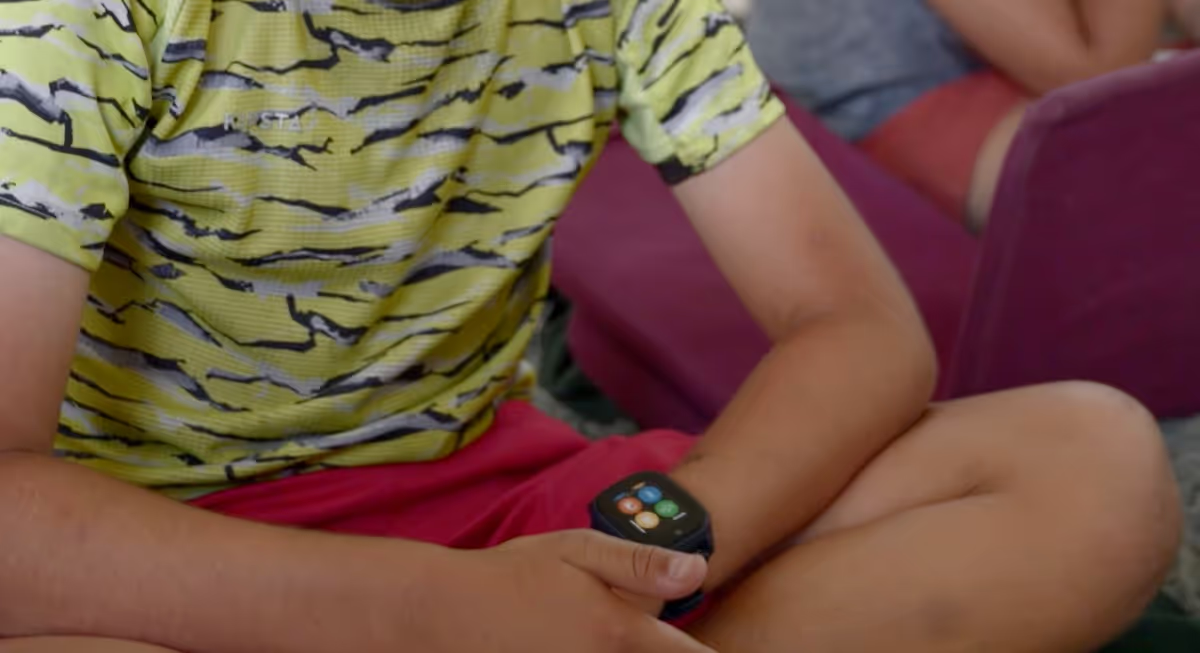


Many conversations around school phone bans have neglected the issue of smartwatches. There is a real cost to arming (pun intended) our kids with these devices and sending them to school. Now is the time to stop and fully address this topic and ensure that schools become smartwatch and phone-free.
It is with great pleasure that I share with you today a piece that Lisa Tabb and I did for Jonathan Haidt's (Author of The Anxious Generation) and researcher Zack Rausch's Substack blog — After Babel.
In it, we discuss the rise of these devices and the problems they pose. We also share clips from our latest film, Screenagers Elementary School Age Edition, which features Jonathan Haidt. As always, I recommend using this to broach this important topic with kids — and share the clips with them!
Today, we’re featuring a post from Delaney Ruston, MD and Lisa Tabb, co-filmmakers of Screenagers movies. The first of the films, Screenagers Growing Up In The Digital Age (2016, updated in 2024), rang the alarm about excessive screen time and its impact on youths’ development, mental health, and family life. Then in 2017, Delaney and Lisa coined the phrase and launched the initiative “Away for the Day,” advocating for phone-free schools.
From the start, Delaney and Lisa have understood the collective action problem. In fact, the entire distribution model of the Screenagers movies is based on it: instead of streaming online or buying individual tickets, viewers must host group screenings at schools, places of workshops, workplaces, and beyond.
Jon first met Delaney and Lisa in 2024 when they came to interview him for Screenagers Elementary School Edition and the updated Screenagers Growing Up in the Digital Age. Delaney is a long-time filmmaker of mental health films, a mother, and a physician. Lisa is a longtime news producer and a mother who has been involved in PTAs and other school programs. Beyond creating the four Screenagers films, they also produce a podcast, and popular blog and continue to grow their Away For The Day phone-free school campaign.
Today, Delaney and Lisa turn their focus away from smartphones to a new “disruption machine” that’s increasingly showing up in elementary schools around the country: smartwatches. They began noticing an uptick in concerns around smartwatch use in schools in 2023. We did not say anything about smartwatches in The Anxious Generation because we were not sure about their effects. As with smartphones, Delaney and Lisa are among the first to ring the alarm. As states consider phone-free school legislation around the country, they should ensure that they are smartwatch-free too. One key test: can it send or receive texts? If so, it is a distraction machine and does not belong on a child’s wrist during the school day. It should be stored away in a pouch, locker, or envelope just like a smartphone.
– Jon and Zach
Learn more about showing our movies in your school or community!
Join Screenagers filmmaker Delaney Ruston MD for our latest Podcast

Learn more about our Screen-Free Sleep campaign at the website!
Our movie made for parents and educators of younger kids
Learn more about showing our movies in your school or community!
- by Delaney Ruston, MD & Lisa Tabb
Imagine a classroom of 2nd and 3rd graders sitting criss-cross applesauce on the carpet in front of their teacher. As they fidget on the floor, she leans in to engage their attention and asks a question: ‘How many of you have a smartwatch?’ Nearly half stretch their hands into the air.
This is the eye-opening scene we witnessed filming our most recent movie — a classroom full of seven and eight-year-olds chatting about how they play games, check social media, message friends, or even sneak YouTube videos on their smartwatches all during the school day.
As the iPhone nears its 18th birthday, the conversation around keeping phones and now watches out of classrooms has finally gone mainstream. School administrators across the country (and abroad) are rolling out phone bans, and parents are battling with their kids to keep their phones off after the bell rings.
But while educators have had their attention focused on smartphones, 5-to-10 year olds have been trooping across the doorsteps of elementary schools wearing watches wired to the internet. In fact, according to one estimate from market.us, approximately 60% of children aged 7–12 owned or regularly used a smartwatch. To complicate matters, this cohort of digital natives has become a target market in-and-of-themselves. Analysts project the global kids’ smartwatch market will be worth $2.0 billion this year.
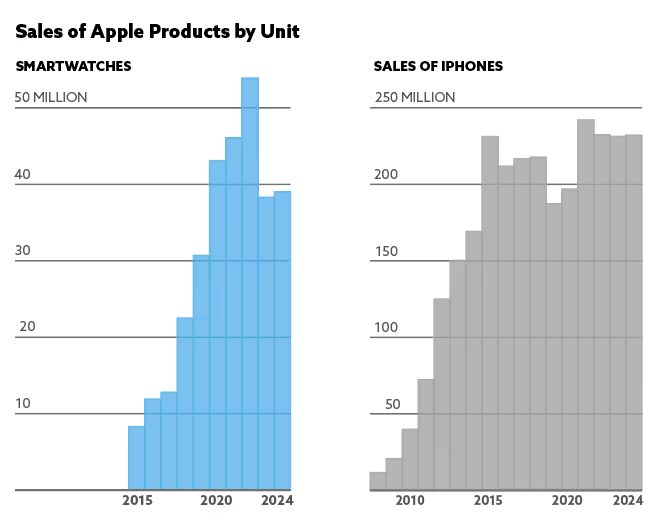
We have been documenting how technology has been rewiring childhood for over a decade, talking to educators, parents, and the youngest generations. In 2016, when we released Screenagers: Growing Up in the Digital Age, the concern was largely around middle and high schoolers. That through-line continued as we made documentaries about screens and mental health and screens and substance use.
But our unique position ahead of the curve has given us startling insight into a sea change that surfaces in our latest film, Screenagers: Elementary School Age Edition. Younger and younger kids now own personal devices, and smartwatches are becoming as disruptive in the classroom as phones. We believe we have an opportunity to address this trend before it takes hold and include smartwatches in school phone-free policies.
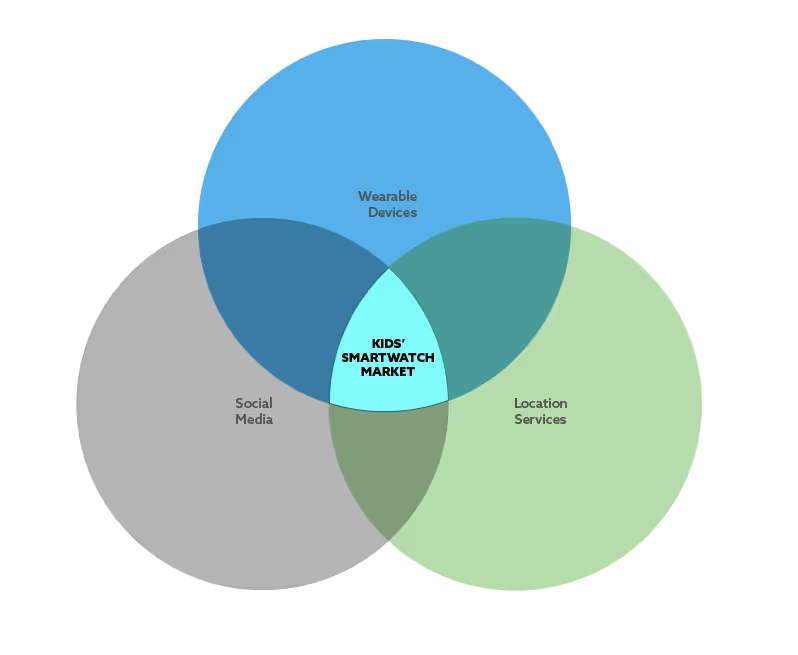
To understand how our children ended up as a target market for smartwatches, it’s helpful to understand how the technology evolved – especially as the firehose of products coming out of Silicon Valley designed to capture our children’s attention shows no sign of slowing. The watches did not have live surveillance functions. When that feature arrived, their popularity exploded.
The earliest smartwatches, made by Garmin, were pitched to adults as a way to improve fitness. Likewise, Garmin’s first kid’s activity bands were pitched to adults as a “motivator” that came with a companion app to let parents manage chores, monitor sleep, and encourage more playtime. The target age was 4 to 9.
The educational toy maker Leapfrog was already selling a wearable, “Think of it as a combination of a pedometer and those Tamagotchi virtual pets.” It skewed toward a more narrow age range, 4 to 7-year-olds. Fitbit had a wearable line for ages 8 to 13. Even UNICEF got into the game with the mission-based Kid Power band for ages 7 to 15: a step tracker where more steps earned more points and more funding to feed malnourished children.
There were only a few digital watches that had solved live mapping (i.e., “tracking”), but they were designed for a specific demographic – families of children with autism as well as people with Alzheimer's. Early versions of the AngelSense device were one. It was created by parents of a child with autism and came with basic GPS tracking and geofencing (a boundary set to trigger an alert if the user moved beyond it.)
When Apple introduced the Apple Watch (in 2015), the target demographic was adults aged 20-45. (That hasn’t changed.) Five years later, Apple introduced "Family Setup" on the iPhone, which was subsequently rebranded "Apple Watch For Your Kids." The watch, the phone, and the surveillance were all tied together. Other tech companies took notice, and in 2019 and 2020, the kids' wearables market took off.
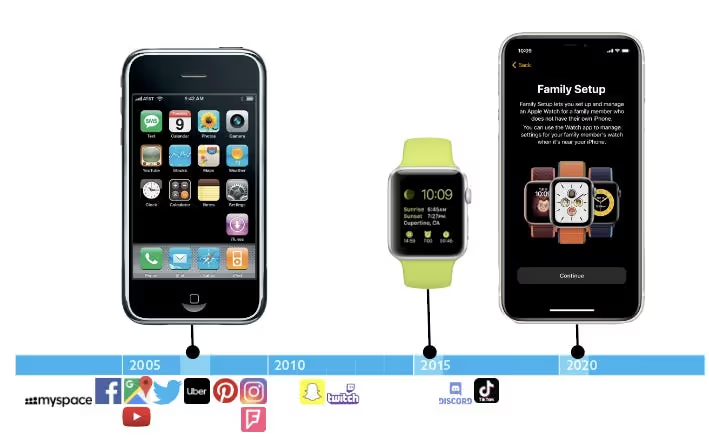
Apple continued to add features: GPS alerts to help with drop-off/pickup and “schooltime mode” that could be switched on — or off — during class. By 2024 geofencing became standard. Parents had already been handing down their old smartwatches to their kids. The new ones came with a full suite of services aimed at modern families.
Every parent has, at one time or another, hovered over a sleeping infant, listening to be sure each breath follows the last in a perfect rhythm. Protecting our children is primal and there are understandable reasons parents would want to maintain an open line of communication with a school-aged child.
Technology has allowed us to respond in emergencies, to juggle life and work and soccer practice and the orthodontist and playdates. But there are crucial factors we tend to overlook when deciding who should be on the live end of a wearable device.
Consider what a text notice triggers: the body becomes alert, and this stress response floods the system with cortisol. Next, anticipation brings a dopamine release, a feeling of pleasure, something we always crave more of. This cycle is just part of what makes text messaging so intrinsically attractive.
Understanding that, we can’t fairly expect an elementary school-aged child whose brain is in a nascent stage of development to self-regulate and keep an Apple watch on “schooltime mode.” Even a 13-year-old cannot keep impulsivity in check. If it’s hard for us to ignore a text, imagine how hard it is for a child who knows his best buddy is in the next classroom typing him a secret message.
Chris has seen this play out firsthand. As a 4th grade teacher, parents have been trusting Chris to shepherd their children through primary education for 25 years. She has been the only adult in the classroom. Until recently.
Normally, when a student is unwell, Chis knows they will turn to her to help. She’s used to sorting out a proper remedy and knows the difference between a bad morning and a nurse's visit. So she was surprised when a parent texted her in the middle of a lesson, saying she was in the parking lot ready to collect her son. It turns out he had texted his mom from his smartwatch, saying he wasn't feeling so good and it was time to go home.
Forty percent of educators think smartwatches pose a disciplinary challenge and teachers are voicing their frustration. Some say after Christmas break, they brace themselves for the wave of new wearables that students bring. And, as more and more schools implement phone-free policies, many kids are using watches to replace smartphones, yet again drawing their attention away from the blackboard.
Additionally, some kids are also using smartwatches to cheat. All you need is a quick search on YouTube to find instructions. Of course, this type of risky behavior is nothing new — the modern version of cheating by writing test answers on a palm with a pen. But add in scrolling, search, and AI, and it’s more like writing the answers on both palms — and arms — all the way up to the shoulders.
We are witnessing smartwatches arrive and disrupt elementary schoolers in the same way we saw smartphones arrive and disrupt attention, mental health, and classroom life.
Knowing what we know, we can stay ahead of the curve and protect our children before the next digital disruption. It’s time to include smartwatches in school phone-free policies and ensure we don’t just replace one distraction with another because smartwatches are not a way to stave off smartphones, they are the gateway.
Learn more about showing our movies in your school or community!
Join Screenagers filmmaker Delaney Ruston MD for our latest Podcast

Learn more about our Screen-Free Sleep campaign at the website!
Our movie made for parents and educators of younger kids
Join Screenagers filmmaker Delaney Ruston MD for our latest Podcast
Be sure to subscribe to our YouTube Channel! We add new videos regularly and you'll find over 100 videos covering parenting advice, guidance, podcasts, movie clips and more. Here's our most recent:
As we’re about to celebrate 10 years of Screenagers, we want to hear what’s been most helpful and what you’d like to see next.
Please click here to share your thoughts with us in our community survey. It only takes 5–10 minutes, and everyone who completes it will be entered to win one of five $50 Amazon vouchers.
Many conversations around school phone bans have neglected the issue of smartwatches. There is a real cost to arming (pun intended) our kids with these devices and sending them to school. Now is the time to stop and fully address this topic and ensure that schools become smartwatch and phone-free.
It is with great pleasure that I share with you today a piece that Lisa Tabb and I did for Jonathan Haidt's (Author of The Anxious Generation) and researcher Zack Rausch's Substack blog — After Babel.
In it, we discuss the rise of these devices and the problems they pose. We also share clips from our latest film, Screenagers Elementary School Age Edition, which features Jonathan Haidt. As always, I recommend using this to broach this important topic with kids — and share the clips with them!
Today, we’re featuring a post from Delaney Ruston, MD and Lisa Tabb, co-filmmakers of Screenagers movies. The first of the films, Screenagers Growing Up In The Digital Age (2016, updated in 2024), rang the alarm about excessive screen time and its impact on youths’ development, mental health, and family life. Then in 2017, Delaney and Lisa coined the phrase and launched the initiative “Away for the Day,” advocating for phone-free schools.
From the start, Delaney and Lisa have understood the collective action problem. In fact, the entire distribution model of the Screenagers movies is based on it: instead of streaming online or buying individual tickets, viewers must host group screenings at schools, places of workshops, workplaces, and beyond.
Jon first met Delaney and Lisa in 2024 when they came to interview him for Screenagers Elementary School Edition and the updated Screenagers Growing Up in the Digital Age. Delaney is a long-time filmmaker of mental health films, a mother, and a physician. Lisa is a longtime news producer and a mother who has been involved in PTAs and other school programs. Beyond creating the four Screenagers films, they also produce a podcast, and popular blog and continue to grow their Away For The Day phone-free school campaign.
Today, Delaney and Lisa turn their focus away from smartphones to a new “disruption machine” that’s increasingly showing up in elementary schools around the country: smartwatches. They began noticing an uptick in concerns around smartwatch use in schools in 2023. We did not say anything about smartwatches in The Anxious Generation because we were not sure about their effects. As with smartphones, Delaney and Lisa are among the first to ring the alarm. As states consider phone-free school legislation around the country, they should ensure that they are smartwatch-free too. One key test: can it send or receive texts? If so, it is a distraction machine and does not belong on a child’s wrist during the school day. It should be stored away in a pouch, locker, or envelope just like a smartphone.
– Jon and Zach
- by Delaney Ruston, MD & Lisa Tabb
Imagine a classroom of 2nd and 3rd graders sitting criss-cross applesauce on the carpet in front of their teacher. As they fidget on the floor, she leans in to engage their attention and asks a question: ‘How many of you have a smartwatch?’ Nearly half stretch their hands into the air.
This is the eye-opening scene we witnessed filming our most recent movie — a classroom full of seven and eight-year-olds chatting about how they play games, check social media, message friends, or even sneak YouTube videos on their smartwatches all during the school day.
As the iPhone nears its 18th birthday, the conversation around keeping phones and now watches out of classrooms has finally gone mainstream. School administrators across the country (and abroad) are rolling out phone bans, and parents are battling with their kids to keep their phones off after the bell rings.
But while educators have had their attention focused on smartphones, 5-to-10 year olds have been trooping across the doorsteps of elementary schools wearing watches wired to the internet. In fact, according to one estimate from market.us, approximately 60% of children aged 7–12 owned or regularly used a smartwatch. To complicate matters, this cohort of digital natives has become a target market in-and-of-themselves. Analysts project the global kids’ smartwatch market will be worth $2.0 billion this year.

We have been documenting how technology has been rewiring childhood for over a decade, talking to educators, parents, and the youngest generations. In 2016, when we released Screenagers: Growing Up in the Digital Age, the concern was largely around middle and high schoolers. That through-line continued as we made documentaries about screens and mental health and screens and substance use.
But our unique position ahead of the curve has given us startling insight into a sea change that surfaces in our latest film, Screenagers: Elementary School Age Edition. Younger and younger kids now own personal devices, and smartwatches are becoming as disruptive in the classroom as phones. We believe we have an opportunity to address this trend before it takes hold and include smartwatches in school phone-free policies.

To understand how our children ended up as a target market for smartwatches, it’s helpful to understand how the technology evolved – especially as the firehose of products coming out of Silicon Valley designed to capture our children’s attention shows no sign of slowing. The watches did not have live surveillance functions. When that feature arrived, their popularity exploded.
The earliest smartwatches, made by Garmin, were pitched to adults as a way to improve fitness. Likewise, Garmin’s first kid’s activity bands were pitched to adults as a “motivator” that came with a companion app to let parents manage chores, monitor sleep, and encourage more playtime. The target age was 4 to 9.
The educational toy maker Leapfrog was already selling a wearable, “Think of it as a combination of a pedometer and those Tamagotchi virtual pets.” It skewed toward a more narrow age range, 4 to 7-year-olds. Fitbit had a wearable line for ages 8 to 13. Even UNICEF got into the game with the mission-based Kid Power band for ages 7 to 15: a step tracker where more steps earned more points and more funding to feed malnourished children.
There were only a few digital watches that had solved live mapping (i.e., “tracking”), but they were designed for a specific demographic – families of children with autism as well as people with Alzheimer's. Early versions of the AngelSense device were one. It was created by parents of a child with autism and came with basic GPS tracking and geofencing (a boundary set to trigger an alert if the user moved beyond it.)
When Apple introduced the Apple Watch (in 2015), the target demographic was adults aged 20-45. (That hasn’t changed.) Five years later, Apple introduced "Family Setup" on the iPhone, which was subsequently rebranded "Apple Watch For Your Kids." The watch, the phone, and the surveillance were all tied together. Other tech companies took notice, and in 2019 and 2020, the kids' wearables market took off.

Apple continued to add features: GPS alerts to help with drop-off/pickup and “schooltime mode” that could be switched on — or off — during class. By 2024 geofencing became standard. Parents had already been handing down their old smartwatches to their kids. The new ones came with a full suite of services aimed at modern families.
Every parent has, at one time or another, hovered over a sleeping infant, listening to be sure each breath follows the last in a perfect rhythm. Protecting our children is primal and there are understandable reasons parents would want to maintain an open line of communication with a school-aged child.
Technology has allowed us to respond in emergencies, to juggle life and work and soccer practice and the orthodontist and playdates. But there are crucial factors we tend to overlook when deciding who should be on the live end of a wearable device.
Consider what a text notice triggers: the body becomes alert, and this stress response floods the system with cortisol. Next, anticipation brings a dopamine release, a feeling of pleasure, something we always crave more of. This cycle is just part of what makes text messaging so intrinsically attractive.
Understanding that, we can’t fairly expect an elementary school-aged child whose brain is in a nascent stage of development to self-regulate and keep an Apple watch on “schooltime mode.” Even a 13-year-old cannot keep impulsivity in check. If it’s hard for us to ignore a text, imagine how hard it is for a child who knows his best buddy is in the next classroom typing him a secret message.
Chris has seen this play out firsthand. As a 4th grade teacher, parents have been trusting Chris to shepherd their children through primary education for 25 years. She has been the only adult in the classroom. Until recently.
Normally, when a student is unwell, Chis knows they will turn to her to help. She’s used to sorting out a proper remedy and knows the difference between a bad morning and a nurse's visit. So she was surprised when a parent texted her in the middle of a lesson, saying she was in the parking lot ready to collect her son. It turns out he had texted his mom from his smartwatch, saying he wasn't feeling so good and it was time to go home.
Forty percent of educators think smartwatches pose a disciplinary challenge and teachers are voicing their frustration. Some say after Christmas break, they brace themselves for the wave of new wearables that students bring. And, as more and more schools implement phone-free policies, many kids are using watches to replace smartphones, yet again drawing their attention away from the blackboard.
Additionally, some kids are also using smartwatches to cheat. All you need is a quick search on YouTube to find instructions. Of course, this type of risky behavior is nothing new — the modern version of cheating by writing test answers on a palm with a pen. But add in scrolling, search, and AI, and it’s more like writing the answers on both palms — and arms — all the way up to the shoulders.
We are witnessing smartwatches arrive and disrupt elementary schoolers in the same way we saw smartphones arrive and disrupt attention, mental health, and classroom life.
Knowing what we know, we can stay ahead of the curve and protect our children before the next digital disruption. It’s time to include smartwatches in school phone-free policies and ensure we don’t just replace one distraction with another because smartwatches are not a way to stave off smartphones, they are the gateway.
Be sure to subscribe to our YouTube Channel! We add new videos regularly and you'll find over 100 videos covering parenting advice, guidance, podcasts, movie clips and more. Here's our most recent:
Sign up here to receive the weekly Tech Talk Tuesdays newsletter from Screenagers filmmaker Delaney Ruston MD.
We respect your privacy.
Many conversations around school phone bans have neglected the issue of smartwatches. There is a real cost to arming (pun intended) our kids with these devices and sending them to school. Now is the time to stop and fully address this topic and ensure that schools become smartwatch and phone-free.
It is with great pleasure that I share with you today a piece that Lisa Tabb and I did for Jonathan Haidt's (Author of The Anxious Generation) and researcher Zack Rausch's Substack blog — After Babel.
In it, we discuss the rise of these devices and the problems they pose. We also share clips from our latest film, Screenagers Elementary School Age Edition, which features Jonathan Haidt. As always, I recommend using this to broach this important topic with kids — and share the clips with them!
Today, we’re featuring a post from Delaney Ruston, MD and Lisa Tabb, co-filmmakers of Screenagers movies. The first of the films, Screenagers Growing Up In The Digital Age (2016, updated in 2024), rang the alarm about excessive screen time and its impact on youths’ development, mental health, and family life. Then in 2017, Delaney and Lisa coined the phrase and launched the initiative “Away for the Day,” advocating for phone-free schools.
From the start, Delaney and Lisa have understood the collective action problem. In fact, the entire distribution model of the Screenagers movies is based on it: instead of streaming online or buying individual tickets, viewers must host group screenings at schools, places of workshops, workplaces, and beyond.
Jon first met Delaney and Lisa in 2024 when they came to interview him for Screenagers Elementary School Edition and the updated Screenagers Growing Up in the Digital Age. Delaney is a long-time filmmaker of mental health films, a mother, and a physician. Lisa is a longtime news producer and a mother who has been involved in PTAs and other school programs. Beyond creating the four Screenagers films, they also produce a podcast, and popular blog and continue to grow their Away For The Day phone-free school campaign.
Today, Delaney and Lisa turn their focus away from smartphones to a new “disruption machine” that’s increasingly showing up in elementary schools around the country: smartwatches. They began noticing an uptick in concerns around smartwatch use in schools in 2023. We did not say anything about smartwatches in The Anxious Generation because we were not sure about their effects. As with smartphones, Delaney and Lisa are among the first to ring the alarm. As states consider phone-free school legislation around the country, they should ensure that they are smartwatch-free too. One key test: can it send or receive texts? If so, it is a distraction machine and does not belong on a child’s wrist during the school day. It should be stored away in a pouch, locker, or envelope just like a smartphone.
– Jon and Zach
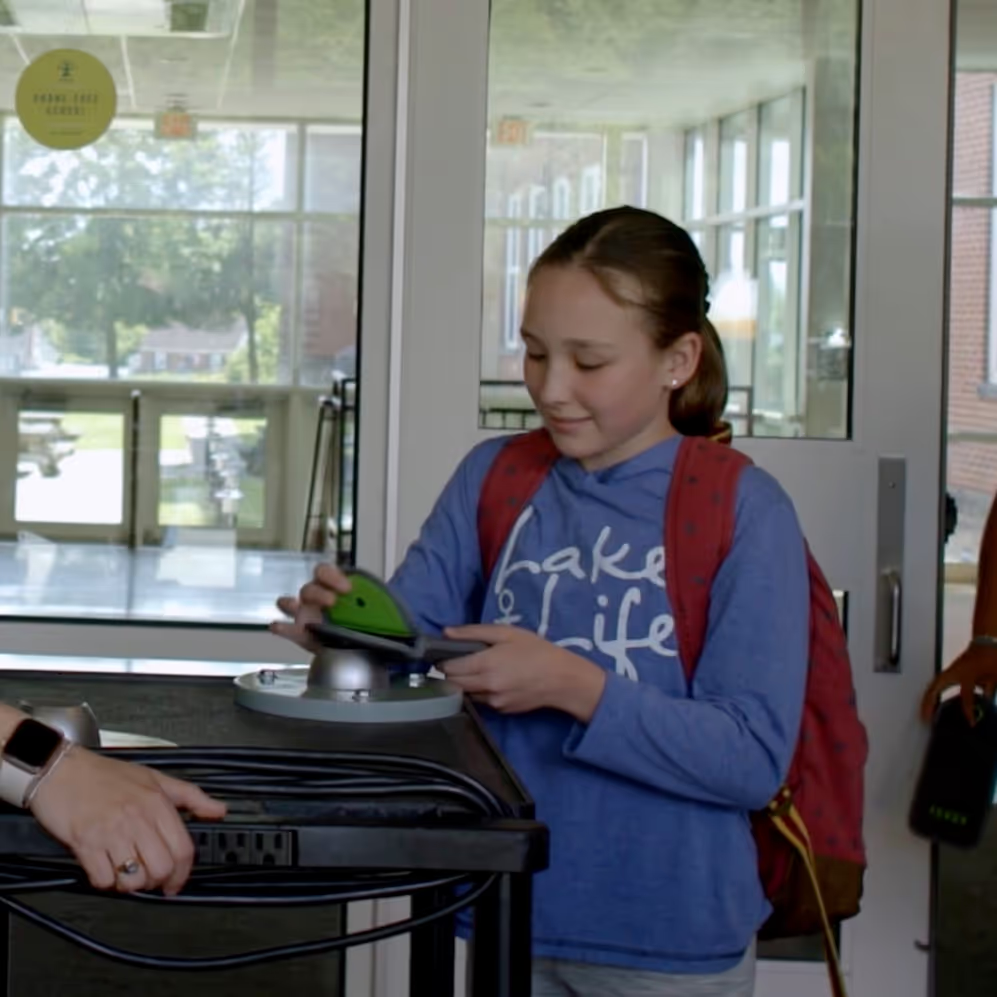
This year, millions of students are experiencing a major shift: school days without phones, smartwatches, or other personal devices. Today we explore the wins, hurdles, and solutions helping schools succeed. We also share our resources that you can use to support technology policy changes in your schools.
READ MORE >
I recently sat down with middle school principal Zach at his school in Washington State. We talked about the challenges Zach and his team faced in his early years as principal when students used phones during school, and how he brought about a powerful transformation by having phones and smartwatches put away in locked pouches for the whole school day. In today’s blog, to raise awareness of the challenges, I share five real examples from Zach of the troubling ways students use phones at school to be unkind.
READ MORE >
Today, I’m sharing an excerpt from the podcast we released yesterday because it really captures all the points I want to make in this blog. It covers the introduction to a conversation I had with a high school principal who made the bold decision, mid-year, to start locking away all smartphones, smartwatches and other devices during the school day, eliminating them from the learning environment. Learn how this went (spoiler: really well) in today’s blog and the full podcast episode.
READ MORE >for more like this, DR. DELANEY RUSTON'S NEW BOOK, PARENTING IN THE SCREEN AGE, IS THE DEFINITIVE GUIDE FOR TODAY’S PARENTS. WITH INSIGHTS ON SCREEN TIME FROM RESEARCHERS, INPUT FROM KIDS & TEENS, THIS BOOK IS PACKED WITH SOLUTIONS FOR HOW TO START AND SUSTAIN PRODUCTIVE FAMILY TALKS ABOUT TECHNOLOGY AND IT’S IMPACT ON OUR MENTAL WELLBEING.
